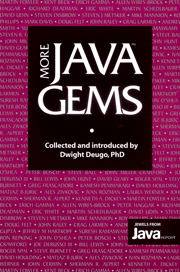Book contents
- Frontmatter
- Contents
- INTRODUCTION
- GETTING STARTED WITH JAVA
- MIGRATING TO JAVA
- TECHNIQUES 101
- MODELING AND PATTERNS
- JAVA IN A DISTRIBUTED WORLD
- THREADS
- USER INTERFACES
- SECURITY
- TESTING
- PERFORMANCE
- COMPLEX JAVA APPLICATIONS: BREAKING THE SPEED LIMIT
- ARE DISTRIBUTED OBJECTS FAST ENOUGH?
- EFFICIENT TEXT SEARCHING IN JAVA
- ENTERPRISE APPLETS AND ARCHIVE FUNCTIONALITY
- REALITY CHECK
- INDEX
ENTERPRISE APPLETS AND ARCHIVE FUNCTIONALITY
Published online by Cambridge University Press: 06 July 2010
- Frontmatter
- Contents
- INTRODUCTION
- GETTING STARTED WITH JAVA
- MIGRATING TO JAVA
- TECHNIQUES 101
- MODELING AND PATTERNS
- JAVA IN A DISTRIBUTED WORLD
- THREADS
- USER INTERFACES
- SECURITY
- TESTING
- PERFORMANCE
- COMPLEX JAVA APPLICATIONS: BREAKING THE SPEED LIMIT
- ARE DISTRIBUTED OBJECTS FAST ENOUGH?
- EFFICIENT TEXT SEARCHING IN JAVA
- ENTERPRISE APPLETS AND ARCHIVE FUNCTIONALITY
- REALITY CHECK
- INDEX
Summary
The promise of Java as a truly distributed software platform is now a step closer to reality. The recent integration of Java archive functionality significantly improves the ability of developers to manage and transfer disbursed data over large networks. Specifically, Java now provides two disparate areas of archiving functionality that address the same issue: an improvement in download time—but through different means. Java Archive files, or JAR files, allow an entire applet's dependency list to be transferred in the form of a single compressed file, while Java's archiving classes provide functionality for the programmatic manipulation of files in various compression formats. Given the benefits of archives in a distributed model, I will detail some of these newly integrated features, as well as demonstrate how archive functionality can improve enterprise applet performance.
JAR FILES
Introduced with the JDK 1.1, Java Archive files provide a vastly improved delivery mechanism for applets. An entire applet's dependency list (all. class files, images, sounds, text, etc.) can now be aggregated into a single compressed file, which can then be transferred over a single HTTP connection. Once downloaded, JDK 1.1-compliant browsers can then seemly decompress and run the applet. The result of this process is a marked decrease in the time it takes to launch an applet, due in part to a reduction of both the bytes transferred and number of dependency-based HTTP transactions.
Java Archive files are based on the popular ZIP archive format as defined by PKWare.
- Type
- Chapter
- Information
- More Java Gems , pp. 421 - 432Publisher: Cambridge University PressPrint publication year: 2000



